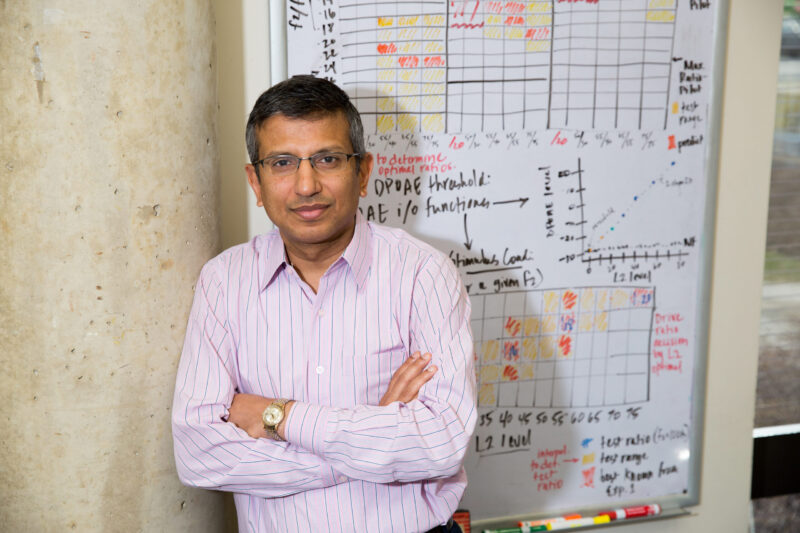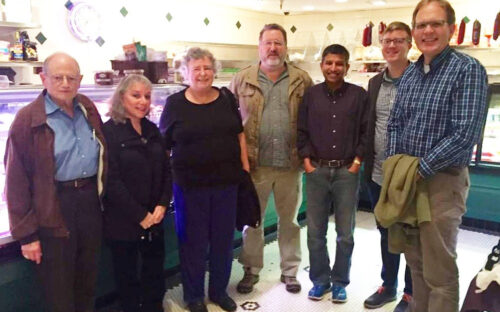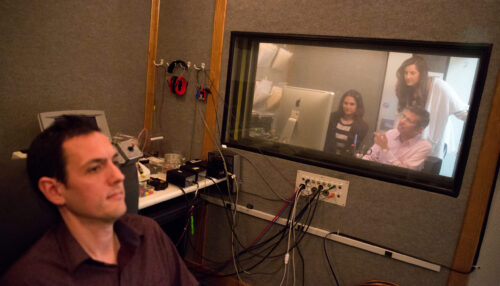Mentorship makes a difference in HHS Distinguished Alumni Award recipient’s audiology career
Written By: Rebecca Hoffa, rhoffa@purdue.edu

Sumitrajit DharPhoto provided
While research has played an important part in Purdue University College of Health and Human Sciences (HHS) alumnus Sumitrajit Dhar’s career, he credits the “soft side of his PhD education,” or the encouragement and faith that his mentors and advisors at Purdue showed him, to joining the faculty in one of the top audiology programs in the country.
A professor in Northwestern University’s School of Communication, Dhar is being recognized with the Purdue HHS 2022 Distinguished Alumni Award for his significant career advancement, long-term leadership and noteworthy professional accomplishments in the speech, language and hearing sciences field.
“What is really satisfying is it tells you that you kind of have — in at least some people’s minds — done what they thought might be a good thing for you to do with the education they give you at Purdue,” Dhar said. “Just that validation is very satisfying.”
When Dhar was completing his undergraduate degree in India, he discovered the speech, language and hearing sciences field. His decision to pursue advanced degrees that weren’t available in India at the time led him to the United States. Dhar earned his master’s degree in audiology at Utah State University and decided to continue his education, working toward a career in academia.
“I applied to two PhD programs. One at Purdue and one at another university. The person I wanted to work with at the other university said ‘If you get into Purdue, go there.’ It made the choice pretty easy,” Dhar chuckled.

Dhar (third from right) poses with members of his lab from Purdue years later at a conference, including his advisors, Glenis Long (third from left) and Arnold Tubis (far left).Photo provided
For his PhD, Dhar decided to work with an interdisciplinary team of professors, consisting of an experimental psychologist and a theoretical physicist — a partnership that he noted was ahead of its time and characteristic of Purdue — because he thought it would offer him a well-rounded education. It was at Purdue that Dhar also developed an interest in neuroscience, expanding his horizons to become involved in the then newly developed program.
During his years at Purdue, Dhar could often be found in the basement of Heavilon Hall or the Physics Building, working in research labs. If he wasn’t there, he was likely kicking around a ball on the intermural soccer fields. In addition to intermural sports, Dhar was also involved in the Indian Classical Music Association of Purdue, as Indian classical music was one of his passions.
Throughout his PhD education, Dhar learned that there were many different paths he could take in being an academic or scientist, and the support of his academic advisors really helped him solidify his career decisions.
“My advisors, Glenis Long and Arnold Tubis, kind of sat me down to help me narrow where I wanted to be and where I could be, and more than anything, they gave me the confidence that I could be at a research-intensive organization and compete for grants,” Dhar said.
Since graduating from Purdue’s audiology PhD program in 2001, Dhar has received the Clarence Simon Award for Teaching and Mentoring for his own mentorship skills, modeling the traits he admired in the faculty at Purdue. While he has published abundant papers and received many grants to offer new insights into hearing loss and hearing healthcare, Dhar expressed that it’s his enjoyment of his work and the value that he sees in it that drives him forward.

Dhar works with students in his lab at Northwestern University.Photo provided
“For me, it’s hard to think I’m doing science because I want to win a big prize, so to speak,” Dhar explained. “You can’t work toward those goals that are mostly out of your control. You kind of have to find a problem that you’re interested in solving and try to solve it as best you can and hope that it’s useful to someone at some point in time.”
While Dhar noted that he has seen the small ways in which his findings have made useful contributions in hearing science, he hopes that the science he has devoted his career to will be valuable long after he is gone.
“Most things mature over time and stand the test of time, and then you can say you’ve made a difference,” Dhar said.
Discover more from News | College of Health and Human Sciences
Subscribe to get the latest posts to your email.